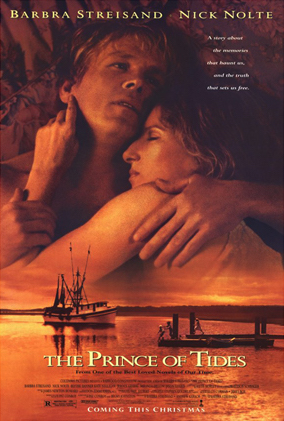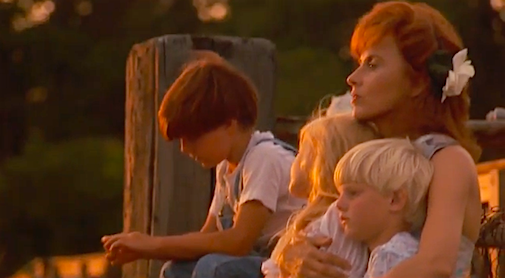by Eric Blume
 Twenty five years ago, director Barbra Streisand delivered her big-screen adaptation of the Pat Conroy novel The Prince of Tides for Christmas. The film went on to win the Best Actor Golden Globe for Nick Nolte, as well as seven Oscar nominations, including Best Picture (but famously not a Best Director nod for Streisand).
Twenty five years ago, director Barbra Streisand delivered her big-screen adaptation of the Pat Conroy novel The Prince of Tides for Christmas. The film went on to win the Best Actor Golden Globe for Nick Nolte, as well as seven Oscar nominations, including Best Picture (but famously not a Best Director nod for Streisand).
Looking at the film now, The Prince of Tides feels like a remnant from a lost Hollywood genre: the mainstream, gimmick-free adult drama. Streisand’s instincts lean to the commercial, and she’s fully devoted to the film’s rather banal psychobabble that purports how one good solid cry can heal a childhood rape. The script may be as deep as a raindrop, but it has its strengths as well, and they’re strengths that align with Streisand’s own...
The first five minutes of the picture essentially sum up the best and the worst of the movie. On the clumsy side, we hear some terribly on-the-nose narration from Nolte, an intrusive and syrupy score, and some embarrassingly over-composed shots of the North Carolina sunsets against her child actors. But Streisand legitimately sees life through this kind of old-fashioned, Hollywood lens. And she uses that investment to lure us into the tale and its Southern Gothic atmosphere. Streisand knows how to drive a compelling story, and once you accept her style, this movie-movie becomes absorbing and satisfying.

Streisand guides Nolte to one of his most surprising and effective performances. As a character actor, Nolte has spent most of his career playing down his looks, but here Streisand films him in classic handsome leading man style. Initially, Nolte seems to be overplaying the Southern accent, but over time he makes you believe how alien he feels in New York City, and how he is unable to escape his innate Southern-ness. He’s gloriously charismatic, relaxed, and funny, and he finds a truly startling moment during his big breakdown scene, where he becomes a little boy again in front of our eyes. It feels daring and weird in such a big studio movie like this, and it’s the highlight of the picture. He probably came close to winning the Oscar that year had it not been for fava beans and a nice Chianti.
The other highlight remains the fierce work from Kate Nelligan as Nolte’s mother (she was nominated for Best Supporting Actress). We see her as the younger version of her character (where she has a ripeness and fearless sexuality about her) and in makeup as the older version (in full Lord-and-Taylor-at-the-Boca-Raton-mall glory).

Streisand fumbles clumsily here and there in the New York scenes (where she allows some comically awful ambient dialogue in traffic and outdoor scenes to show how “crazy” the city is). But she keeps this Southern-fried epic on the rails until the final half-hour, when she dips into uncomfortably indulgent romantic schmaltz with the central love story. A section where Nolte and Streisand escape to a country cottage goes on for almost a full ten minutes where absolutely nothing happens except the two of them kissing in a sea full of candles. And Nolte tells Streisand she’s beautiful at least three times in the movie, each time to a coquettish demur, and it’s uncomfortable and sad to witness.
One could quibble at length about Streisand’s actual performance, but the bigger point remains that she’s grossly miscast. In Tides, Streisand seems intent on making herself seem “real” and that’s simply not a trait that comes naturally. Plus, Streisand’s onscreen persona is built upon her being special, a creature who isn’t “like us”. She’s one of the last of the Hollywood stars who felt actually larger than life, that we wouldn’t meet in our everyday, and who felt born for the screen as a result. Her confrontation scenes with her real-life son Jason Gould (who gives a lovely performance as her onscreen son) feel like phony movie versions of what was possibly a real-life dynamic. His casting should bring a depth and intimacy to the scenes, but somehow Streisand seems miscast as his mother… she comes across more like a very efficient nurse or one of his mentors from the JCC.
 Barbra's "Tides" men: Jason Gould & Nick Nolte
Barbra's "Tides" men: Jason Gould & Nick Nolte
What The Prince of Tides does maintain, twenty five years later, is a sweep and a grandeur, plus a pulse to the storytelling. It’s a product of its time, and while the love story feels mushier than ever, Nolte’s journey still has a sting and a vibrancy that hold steady.
